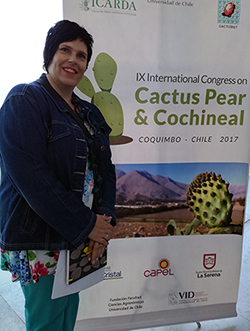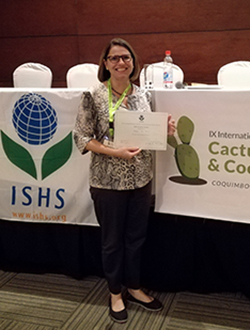
Dr Maryna de Wit, one of the
UFS delegation team was appointed
coordinator for Agro-Processing
and Post-Harvest Technology during
the congress

Dr Alba du Toit, also one of the members
of the UFS delegation during the
congress at the University of Chile
in Santiago, Chile.
Photos: Supplied
Dr Alba du Toit, a junior lecturer in Consumer Science at the University of the Free State (UFS), presented her research at the recent IX International Congress on Cactus Pear and Cochineal at the University of Chile in Santiago, Chile. The congress was themed, “CAM Crops for a Hotter and Drier World”.
Dr Du Toit, Prof HO de Waal and Dr Maryna de Wit, from the Faculty of Natural and Agricultural Sciences at UFS, attended the five-day conference held between 26 and 30 March 2017.
Congress a platform for networking
The congress, held every three years since 1993, gathers cactus pear researchers, growers and processing managers from Europe, the Americas, Asia and Africa to review current research trends by networking to form new collaborations that could lead to increased efficiency and shared knowledge. They also present new findings and plan for future research.
Great achievements for researchers
Dr Du Toit said: “My research on cactus pears focused on the utilisation of the slimy substance found in the cactus cladodes as a functional ingredient in innovative nutraceutical food products”. Functional foods are foods that promote health or prevent disease through adding or omitting specific ingredients. She also received the International Society of Horticultural Science award for best student oral presentation.
Dr De Wit also presented her research and was appointed coordinator for Agro-Processing and Post-Harvest Technology at the congress.
Dr Herman Fouché, Affiliated Researcher at the Department of Soil-, Crop- and Climate Sciences at UFS, developed “kuilmoes”, a type of silage from pulped cactus pear fruit, mixed with lucerne, in collaboration with Prof de Waal, which was also presented.at the congress.